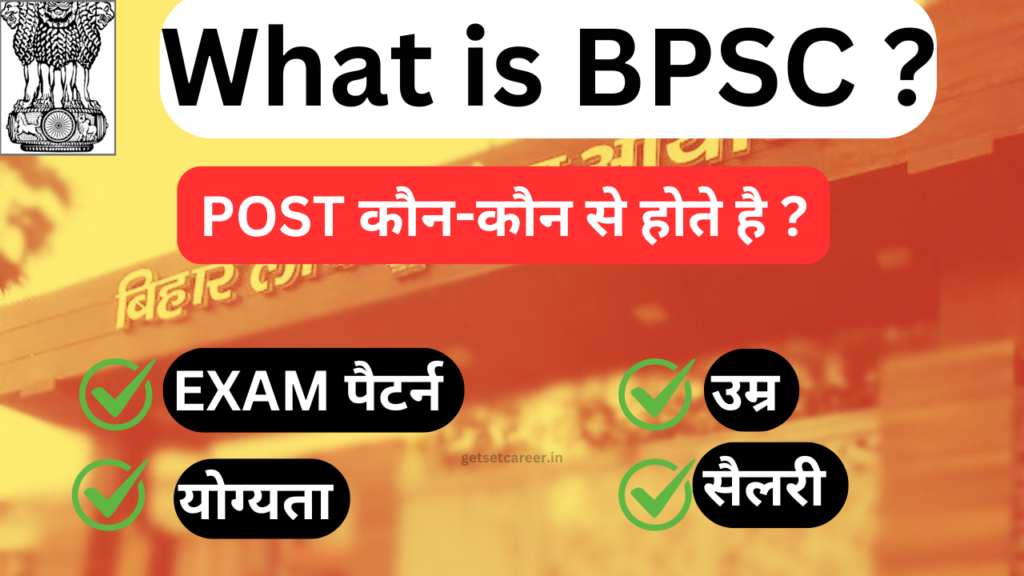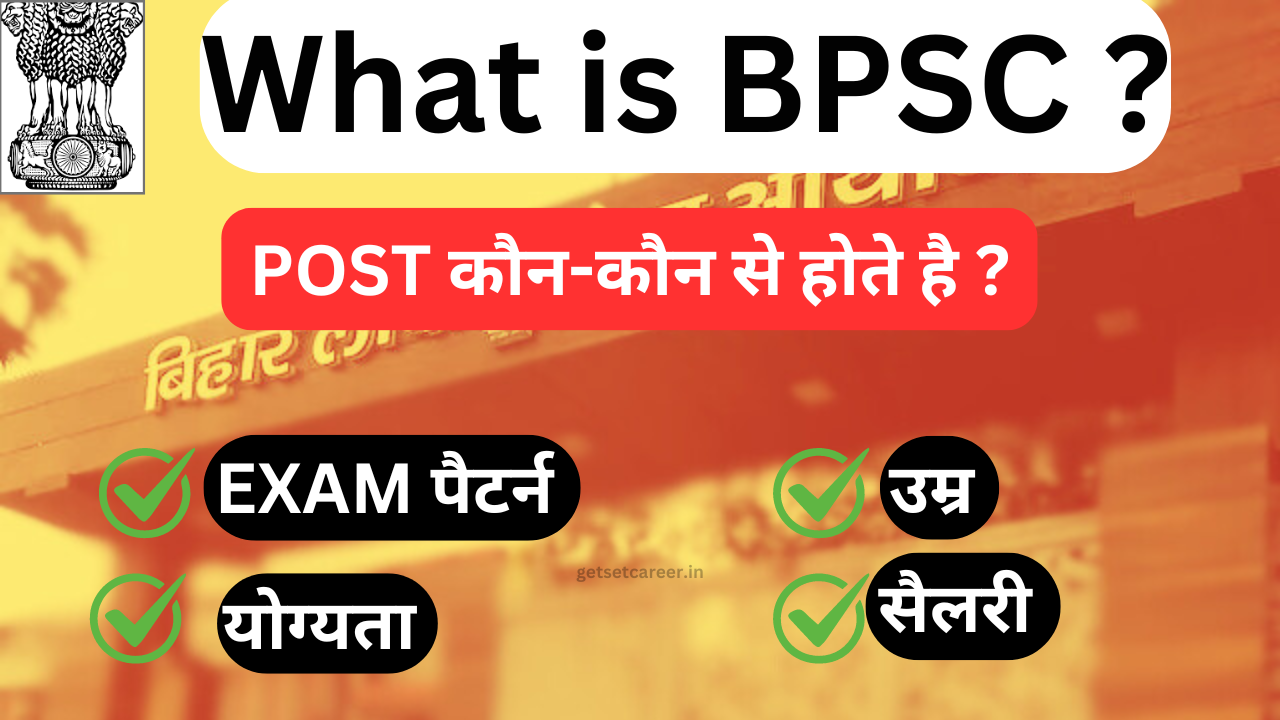
The Bihar Public Service Commission (BPSC) plays a pivotal role in the administration of Bihar, recruiting civil servants to uphold the functioning of the state’s government. This blog aims to provide a comprehensive guide to BPSC, covering its history, structure, examination process, eligibility criteria, and its impact on aspirants. this guide will give you all the information you need to understand this essential institution.
What is BPSC? (Bihar Public Service Commission)
The Bihar Public Service Commission (BPSC) is a constitutional body under Article 315 of the Indian Constitution, responsible for selecting candidates for various administrative roles in the Bihar government. The commission’s primary purpose is to conduct civil services examinations and competitive tests for positions in state services, ensuring merit-based recruitment for a transparent, efficient governance system.
History and Evolution of BPSC- How It Evolved?
The BPSC was established on November 1, 1956, following India’s independence and the reorganization of the state’s administration. Since its inception, BPSC has been pivotal in selecting qualified candidates for a variety of roles within Bihar’s public sector. The commission operates autonomously to maintain the integrity and fairness of recruitment processes.
Initially, the BPSC was entrusted with a limited number of roles, but over time, as Bihar’s administration and responsibilities grew, so did the importance and scope of the commission. It now recruits candidates for numerous administrative and non-administrative services, including the Bihar Administrative Services (BAS), Bihar Police Services (BPS), and more.
Functions and Roles of BPSC in Bihar Government-
The Bihar Public Service Commission has various key functions:
Recruitment to Civil Services: Conducting exams and interviews for recruiting officers in state administrative services, police services, revenue services, and other essential departments.
Advisory Role: Advising the state government on matters related to recruitment, promotions, and disciplinary actions of civil servants.
Transfers and Promotions: Recommending transfers and promotions for state civil servants, ensuring fairness and meritocracy.
Framing and Amending Recruitment Rules: Assisting in creating recruitment guidelines, ensuring they are regularly updated to meet changing administrative needs.
BPSC serves as the backbone for the administrative machinery of Bihar, ensuring a meritocratic, well-functioning bureaucracy.
BPSC Examinations and Recruitment Process- How Officers are recruited?
BPSC conducts several examinations for various positions, but its most well-known exam is the Bihar Combined Competitive Examination (BCCE) or the BPSC Civil Services Examination.
BPSC Civil Services Examination– The BPSC Civil Services Examination is the main gateway for candidates aspiring to enter Bihar’s prestigious administrative services. This examination is conducted in three stages:
- Preliminary Examination (Prelims): An objective-type exam that serves as a screening test. It consists of one paper of General Studies (GS) for 150 marks.
- Main Examination (Mains): Candidates who clear the Prelims are eligible for the Mains. It is a written examination that includes several descriptive papers, usually including General Hindi, General Studies, and an optional subject of the candidate’s choice.
- Interview (Personality Test): Candidates who pass the Mains are called for a personal interview, assessing their personality, knowledge, and suitability for administrative roles.
What Are The Other Exams Conducted by BPSC?
Apart from the Civil Services Examination, BPSC also conducts:
- Assistant Engineer Examination
- Assistant Prosecution Officer Examination
- Assistant Professor Recruitment
- Bihar Judicial Services Exam
- Child Development Project Officer (CDPO) Exam
- Bihar Forest Service Exam
- These exams serve different departments and roles, offering a wide array of opportunities for candidates from various educational backgrounds.
What Is The Eligibility Criteria for BPSC Exams?
To appear for any BPSC exam, candidates must meet specific eligibility criteria. These requirements vary slightly depending on the examination, but general guidelines for the BPSC Civil Services Examination are:
- Nationality: Candidates must be citizens of India.
- Educational Qualification: A bachelor’s degree in any discipline from a recognized university is required. Final-year students can also apply, provided they can produce the degree at the time of interview.
- Age Limit: Generally, candidates must be between 21 and 37 years of age. Age relaxation is provided for reserved categories as per government norms. Category Age Limit–
- General (Male) 37 years
- General (Female) & OBC 40 years
- SC/ST 42 years
Syllabus and Exam Pattern of BPSC
The syllabus for the BPSC Civil Services Examination is comprehensive, covering a wide range of subjects. It is broadly divided into the following categories:
- Preliminary Exam: General Studies, including Current Affairs, Indian History, Geography, General Science, Indian Economy, and Polity.
- Mains Exam:
- General Hindi (Qualifying)
- General Studies I: Indian History, Indian Polity, Geography
- General Studies II: Indian Economy, Science, Current Affairs
- Optional Subject: Candidates choose from a list of 34 subjects, including History, Geography, Public Administration, and Sociology.
Understanding the BPSC exam pattern is crucial for effective preparation, as candidates must not only have factual knowledge but also the ability to write clear, concise, and analytical answers in the Mains.
Preparation Strategy for BPSC-How to prepare for BPSC?
Cracking the BPSC examination requires dedication, strategic planning, and focused preparation. Here’s a step-by-step preparation strategy:
- Understand the Syllabus: Begin by thoroughly understanding the syllabus and exam pattern. This will help in focusing on relevant topics.
- Study Material: Choose the right study material, including NCERT books for basics, along with standard texts like Laxmikant for Polity, Bipin Chandra for History, and current affairs compilations.
- Regular Practice: Practice with mock tests and previous years’ question papers to improve speed and accuracy. Writing mock tests will also help in mastering the Mains.
- Revision: Make concise notes during preparation, and revise them regularly.
- Stay Updated with Current Affairs: Daily newspapers and monthly magazines like Yojana and Kurukshetra will help candidates stay updated on current issues.
Job Profiles Offered Through BPSC Exams
Successful candidates from the BPSC Civil Services Examination are offered roles in several prestigious departments, including:
- Bihar Administrative Service (BAS): Officers handle administrative functions, maintain law and order, and implement state policies.
- Bihar Police Service (BPS): Selected candidates manage law enforcement and police activities in Bihar.
- Bihar Financial Service (BFS): Officers manage financial and budgetary matters of the state government.
- Bihar Revenue Service: They deal with land revenue administration, managing property-related issues.
- Each job profile offers opportunities for growth, promotions, and responsibilities that impact Bihar’s governance.
What Is Difference between BPSC and UPSC: Key Differences
While both BPSC and UPSC (Union Public Service Commission) recruit officers for public services, there are some key differences:
| Feature | BPSC | UPSC |
| Scope | Scope Bihar state-level services | All-India services |
| Exam Difficulty | Moderate | High |
| Posts Offered | State Administrative, Police | IAS, IPS, IFS, IRS |
| Age Limit | Higher relaxation for BPSC | Uniform across categories |
| Languages | Hindi & English | English as primary language |
What Is Impact of BPSC on Bihar’s Governance?
The BPSC is instrumental in ensuring that Bihar’s government functions effectively by recruiting talented individuals for administrative roles. It upholds the integrity of Bihar’s bureaucratic system by fostering merit-based recruitment and discouraging nepotism. Civil servants selected through BPSC significantly contribute to policy implementation, social justice, law enforcement, and developmental projects in the state.
Challenges Faced by BPSC examination
Despite its importance, BPSC faces several challenges, including:
- Delayed Examinations: The commission has faced criticism for delays in conducting exams and declaring results, which affects aspirants’ careers.
- Political Interference: At times, allegations of political influence have raised concerns about transparency in the recruitment process.
- Infrastructure and Resource Constraints: The commission needs more resources and technological upgrades to ensure smoother functioning.
What is the Future of BPSC?
With advancements in technology and governance reforms, the BPSC is likely to embrace modern tools like digital assessments, online applications, and enhanced transparency measures. This would improve efficiency and ensure a faster, smoother recruitment process.
Conclusion
The Bihar Public Service Commission (BPSC) stands as a crucial pillar in the state’s governance structure, offering aspirants the opportunity to serve society through various civil services.
A solid understanding of the exam structure, syllabus, and preparation strategy is key to success. With proper dedication and the right resources, candidates can not only clear the BPSC examination but also contribute to Bihar’s growth and development.
BLOG BY- getsetcareer.in

Hii